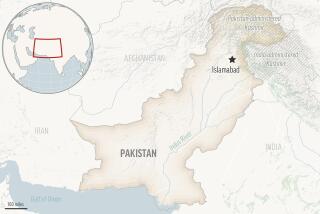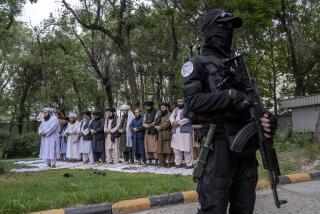Troops Battle Rebels in Pakistan; 20 Killed
- Share via
PESHAWAR, Pakistan — Sixteen suspected militants and four Pakistani soldiers were killed after security forces clashed with guerrillas in the restive North Waziristan tribal region near the Afghan border, military officials said Wednesday.
Nineteen militants were captured during heavy fighting in the Shawal valley, the military said in a statement released in Peshawar. Attack helicopters and artillery were involved in the seven-hour battle, one official said.
The statement indicated that the bodies of eight militants had been recovered, and that the fleeing guerrillas either buried or carried away the bodies of others.
However, a spokesman for a wanted cleric involved with the militants denied that any guerrillas were killed or taken prisoner. “Our mujahedin are safe and the government’s claims are totally baseless,” Tariq Jamil, a spokesman for cleric Sadiq Noor, said by telephone.
Clashes erupted after militants attacked troops in the Shawal and Datakhel areas Tuesday night, officials said. Four soldiers were killed and five were wounded in the initial assaults, they said.
On Wednesday, troops struck back in the Shawal area, which officials said was a militant stronghold. Cobra attack helicopters, which were on standby at a military base in the adjacent Bannu district, were called to assist ground forces.
Heavy artillery shelling forced civilians to flee the area, said one source who requested anonymity. Security forces destroyed large caches of arms and ammunition during the search operation targeting suspected compounds, the military said.
Guerrillas linked to the Taliban movement, which ruled in neighboring Afghanistan until U.S.-led forces invaded in late 2001, also launched an attack in the Datakhel area, about 15 miles west of Miram Shah, the administrative headquarters of North Waziristan.
Meanwhile, a visiting U.S. diplomat met Wednesday with Pakistani President Gen. Pervez Musharraf and declared that Pakistan and Afghanistan needed to cooperate to defeat the “common enemy” at their shared frontier, the Associated Press reported.
“There’s a common enemy in the form of the Taliban and extremists. There’s a common problem in terms of extending the control of government into border areas,” Richard Boucher, assistant secretary of State for South and Central Asian affairs, said in Islamabad, the Pakistani capital. “The only way to stop this is to have cooperation.”
Relations between the Asian neighbors have deteriorated after Afghan President Hamid Karzai in February handed Pakistan a list of top Taliban figures believed to be hiding inside Pakistan, and the locations of suspected terrorist training camps. Musharraf responded that the information was outdated and maintained that Pakistan was doing all it could to stop militants from launching cross-border attacks.
On Wednesday, Boucher said the U.S. was satisfied that Pakistan was making a “maximum effort” to fight Taliban and Al Qaeda militants.
More to Read
Sign up for Essential California
The most important California stories and recommendations in your inbox every morning.
You may occasionally receive promotional content from the Los Angeles Times.










